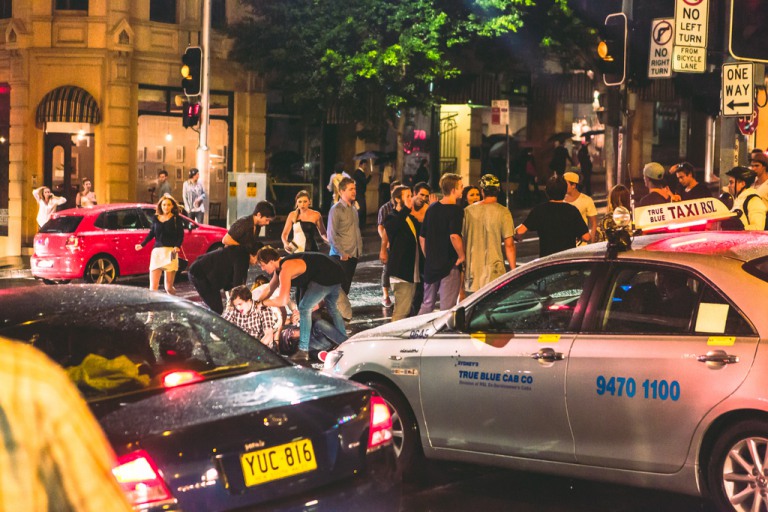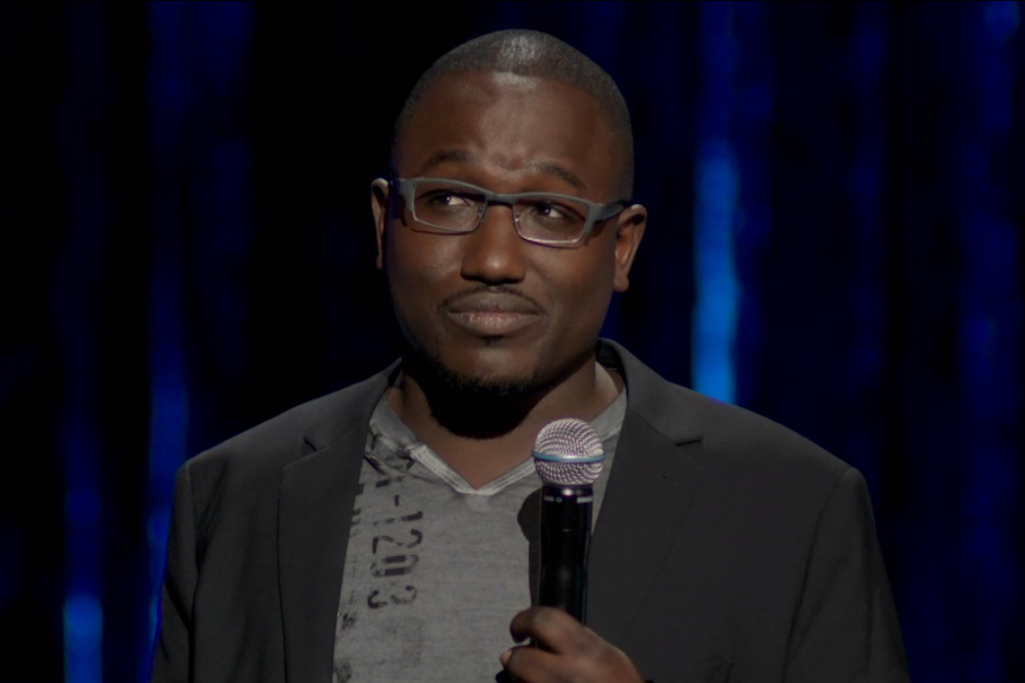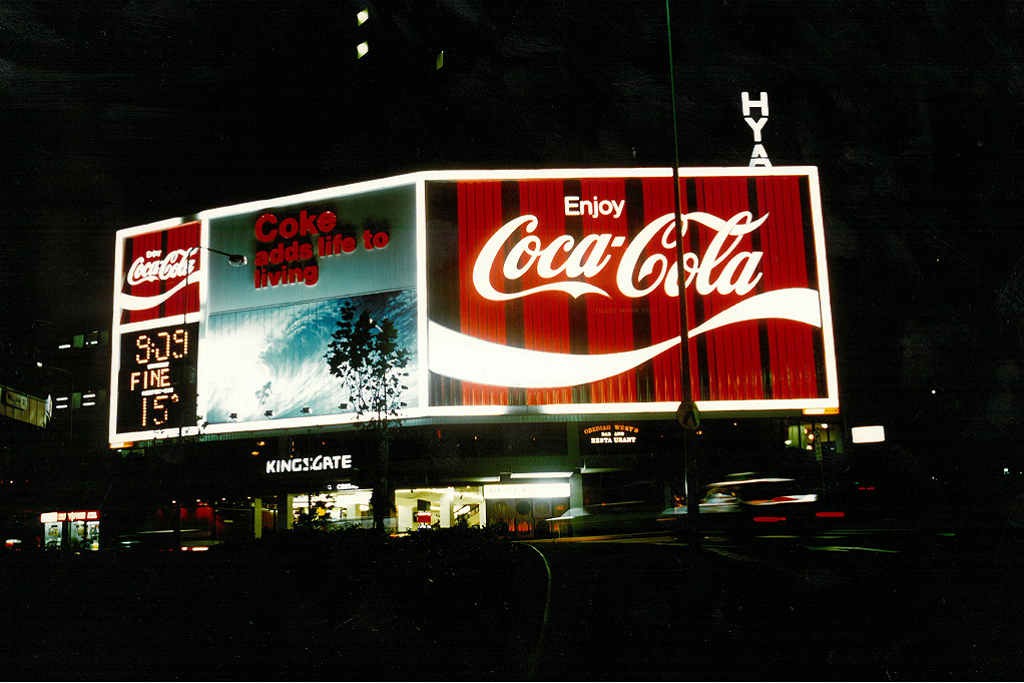It’s Not Just Lockout Laws; Fear And Confusion Are Killing Sydney’s Nightlife
Noise complaints, regulation and over-policing are strangling Sydney.

Last week, a series of noise complaints, kicking off at the wild hour of 7.30pm, resulted in Sydney’s Kings Cross Hotel cancelling a Vivid Sydney event before 9.30pm.
The punk act, Birdman Or The Unexpected Virtue of A Tony Hawk Pro Skater Cover Band, started playing at 9.15pm and were told to stop after only four songs into what, according to attendee and music journalist Mitch Feltscheer, was a fairly standard night.
“As someone who’s been to literally hundreds and hundreds of gigs, I can confidently say it was no louder than any similar sized venue I’ve been in,” Feltscheer told Junkee. “If anything it was on the softer side of your average punk gig, I was barely half a metre from one of the speakers and could still be heard by my friend, in usual gig style i.e. right at her ear, but still.”
While early reports indicated that the event was shut down by cops, NSW Police have told Junkee that they were not involved. Feltscheer, however, reports the cancellation announcement included claims the cops had visited the venue.
Four punk songs in the basement of Kings Cross Hotel at 9pm and this bullshit city can't even handle it. Get absolutely fucked.
— Mitch Feltscheer (@mitchfel) June 1, 2017
The City of Sydney has also confirmed they did not receive any complaints, and Adam Lewis, the Group Entertainment Manager of Solotel, who manage the Kings Cross Hotel, told Junkee that “the noise issue was between the venue and our local residents, rather than police or regulatory bodies.”
“For this party, we tried activating a fairly-underused space, which we didn’t expect to have any issues with — but unfortunately in regards to noise complaints, we found ourselves in a position where we couldn’t continue without risking some longer-term ramifications,” Lewis said. He declined to specify what these ramifications might be.
“In regards to moving forward, this won’t change that commitment nor the number of artists we work with weekly as they are elsewhere in the venue, and we don’t run into the same issues there (it’s a big venue!). It’s a really disappointing result for all involved. We worked really hard to be able to do some great, unusual programming in that space — but it’s something we’re going to ensure is also an isolated incident.”
Putting aside for now what kind of nerd complains about a Kings Cross gig at 7.30pm, the obvious question here is what kind of atmosphere has allowed this to happen? A venue has cancelled an underground punk event, 30 minutes before residential noise pollution rules come into effect, for fear of jeopardising long-term success. What’s going on?
What Is Happening To Sydney Music Venues?
It needs to be stressed that, although this was a unique, perhaps over-cautious decision for the Kings Cross Hotel, management didn’t make it in a vacuum.
And while lockout laws have attracted the most national attention in this space, Lewis told Junkee that, from his personal perspective, the “the lockouts are absolutely the tip of the iceberg here”. “[Lockouts are] more a symptom of broader issues around how live music and late-night culture are perceived.”
“There’s often an adversarial approach towards late-night culture throughout a lot of the groups that oversee how our city runs, and it’s reflected in how our live music venues and clubs are regulated,” Lewis said. “We are also held back by this ongoing narrative that suggests that late-night culture and safety are mutually exclusive; that to get one you need to sacrifice the other.
“That’s not true, and as long as we operate as a society with that base assumption, our city’s culture will continue to lose out.”
Come get your yearly culture and art fix by taking Instagrams of purple walls but make sure to be in bed by 10pm and please be quiet.
— Mitch Feltscheer (@mitchfel) June 1, 2017
Instead, the current issues for venue owners and managers appear to be threefold: residential complaints, city regulations, and over-policing. And while they don’t all relate directly to Lewis’ decision, they are demonstrably contributing to a culture of fear and confusion within the ecosystem.
Glebe’s Harold Park Hotel exemplified those first two concerns when, after its first complaint in six years of running acoustic courtyard sessions, it was forced to cancel events in January.
Unlike the Kings Cross Hotel incident, this one was down to the venue flouting outdoor music regulations for five years. Hotel owner William Ryan told The Sydney Morning Herald he hadn’t applied because of regulatory fees, including $15,000 for an acoustic report, but his decision meant Ryan faced a $6,000 fine if the events continued.
And in the most recent controversy before the Kings Cross incident, William St’s Club 77 was raided on Saturday May 27 in an example of what can at best be described as overzealous policing.
According to owner Matty Bicket, 15 police officers and a sniffer dog entered the venue and, despite “zero arrests [and] zero drugs found,” searched and removed guests (including the headline DJ who was then barred and prevented from playing his set), tasered someone in a back alley, returned later to police the area again, and effectively ignored the venue operator throughout the entire process.
“The result of this? A bad taste in my mouth for over the top policing, a loss of income, and a pissed off promoter,” Bicket wrote on Facebook. “I’m running a fucking business, I pay tax and I work extremely hard to hold onto what we have here to keep a culture, I don’t deserve to be bullied and treated like a fucking criminal. I don’t know any other type of business or industry that gets treated so poorly.”
Sydney: a global city of innovation and culture ? pic.twitter.com/tWvM3pxeKS
— Sandro Dallarmi (@Sandrolami) May 28, 2017
For their part, NSW Police denied tasering anyone but confirmed raids were conducted across parts of Sydney, which included searching 40 people and finding drugs on 13 across various clubs, nine of whom were issued court attendances.
While Bicket has declined to comment further considering the police investigation, he was quoted by Daily Mail saying “our rights are pretty minimal; if you own a venue and stand up to the police during these kind of situations, you’re asking for trouble unfortunately’.
The raid follows a similar incident in December, where 40 police raided Candy’s Apartment in Kings Cross and issued a 72-hour shutdown notice, despite only arresting person outside the club itself. The incident was strongly criticised by Keep Sydney Open, who argued that “there are numerous other ways in which such an operation could have been conducted to avoid alarming patrons or hitting the pockets of hardworking artists and staff.”
What’s The Solution?
The best hope for a solution to those first two problems, residential concerns and regulatory confusion, can be found in the City of Sydney’s Live Music and Performance Action Plan, which was first put out in 2014 in response to the declining music scene.
Working with both industry and community members, the council devised 60 action points to be implemented over five years, including one-on-one support for venues, clarification of noise pollution rules, and advocating changes to the NSW Government and other organisations.
Councillor Jess Miller told Junkee that, on top of offering direct resources and funding for music venues in need of regulatory support (including the Harold Park Hotel), council are considering long-term solutions such as the Agent of Change policy. This puts the impetus on developers and owners to soundproof new residences.
“In short, for the Howard Park Hotel example, you can’t give permission if they don’t ask,” Cr Miller said. “The unfortunate thing is that there is a rule book, and what everybody keeps telling us is: it’s really difficult.”
As of February 2017, the council has enacted 48 percent of its action points, including $2.77 million in small grants (each under $100,000) to live music and performance projects, one-on-one support to over 150 live music and performance businesses and organisations, and matched funding for venues to access acoustic advice.
Those yet to be implemented include planning control and compliance policy reforms to support venues and refine the City’s approach to managing entertainment noise, as well as the publication of a “How-To’ guide for live music. It’s also planning to convene a music and cultural policy working group and forum in partnership with FBi Radio. Venues facing any additional challenges are invited to contact the group directly.
But while we can hope for the action plan to empower both venues and residents in this regard, it realistically cannot cover some of the community’s more pressing concerns. By Miller’s own admission, the council is subject to state government policies, and while advocating against the lockout laws has been a central tenant of its work, there is only so much they can do as local government.
Notably, the action plan does not address the over-policing issue. But regulatory approvals and sound-proof residences won’t mean anything if clubs are still dealing with random (and relatively unsuccessful) raids. The public has to be willing to hold NSW police to account on this matter if clubs are going to be secure that future events go uninterrupted.
That, or cops could just stop with the disproportionately heavy raids of clubs. Both would work.
–
Feature image via Kings Cross Hotel.


